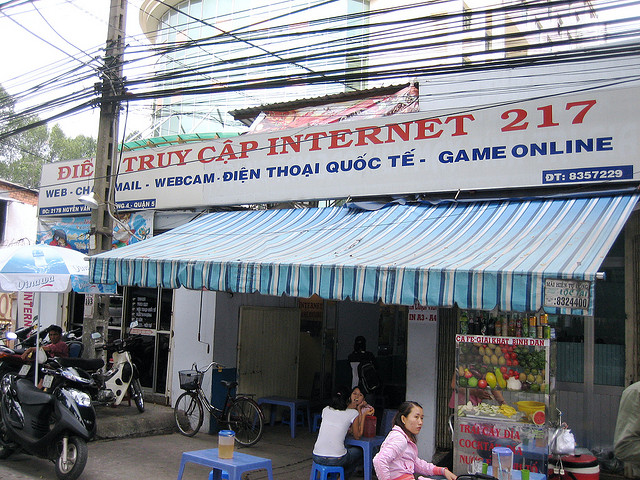Most of this report was researched, written, and edited by Hae-in Lim, Lisa Ferguson [1], Alex Laverty, Ellery Roberts Biddle [2] and Sarah Myers [3].
Global Voices Advocacy's Netizen Report offers an international snapshot of challenges, victories, and emerging trends in Internet rights around the world. This week we begin in Vietnam, where drastic new restrictions for online speech will soon come into force.
Free Expression

Internet cafe in Saigon, Vietnam. Photo by Ivan Lian. (CC BY-NC-ND)
Vietnam's Internet may take a serious hit come September, when a new decree law banning a wide range of online content will come into force. According to the Bangkok Post [4], Decree 72 requires ISPs to block all content that is “against Vietnam, undermining national security, [or] social order… or information distorting, slandering and defaming the prestige of organisations, honour and dignity of individuals.” The law will require online services to divulge the identities of users who create such content. It also will prohibit sharing news or “information on current events” on social media sites. The Committee to Protect Journalists [5], RSF [6], and other have condemned the law.
Chinese singer Wu Hongfei was arrested [7] for threatening to blow up “two Beijing municipal government agencies and a bunch of people [she] hate[s]” on Sina Weibo. Wu's lawyer argues that her words were impulsive and presented no real threat to the public.
Peruvian lawmakers introduced a new bil [8]l aimed at protecting children from online pornography. Under the proposed law, a government commission would determine what content Internet Service Providers should block. It remains unclear if and how a filtering mechanism might be implemented in the effort. Critics argue [9] [es] that the law will lead to overblocking of lawful, age-appropriate content.
Twitter has added a “report abuse” [10] button to its service to help combat abusive behavior following a series of incidents in the UK, including threats of rape directed at feminist campaigner Caroline Criado-Perez [11] and MP Stella Creasy [12].
Thuggery
Prominent Vietnamese dissident blogger Nguyen Van Hai ended his 35-day-long hunger strike [13] after Vietnam’s highest prosecutors’ office agreed to investigate his complaint over poor conditions and abusive treatment in prison. The concession came after US President Barack Obama called on Hanoi to release all political prisoners. The UN Working Group on Arbitrary Detention also has adopted his case.
The private offices of Frank La Rue [14], United Nations Special Rapporteur on the Right to Freedom of Opinion and Expression were broken into [15] on July 31 in Guatemala City. Thieves took several computers [16] [es] and documents. UN HRC Coordination Committee Chair Chaloka Beyani said of the incident: “any attack on a Special Rapporteur is always cause of concern, particularly in countries with a recent history of tensions with human rights defenders.” Mr. La Rue is an expert in international human rights law and a champion for the protection of human rights on the Internet.
Intellectual Property
Under Russia’s new ‘SOPA [17]’ law, copyright holders can make claims before the Moscow City Court and Roskomnadzor, Russia’s communication watchdog, requesting that infringing sites be blocked. After the updated law came into force last week, 1,700 sites in Russia protested [18] by staging blackouts. The law has also been criticized by Google and Yandex, the largest search engine in Russia.
From now on, all research published by faculty at the University of California will be available to the public at no charge, thanks to the state university system's new Open Access Policy [19].
Surveillance
Fallout from PRISM continues. In Brazil, the Marco Civil da Internet [20], formerly characterized as a Bill of Rights for netizens, is undergoing major revisions [21] as politicians pile on provisions intended to shield citizens from espionage by the US government. One such initiative calls for Brazilian user data to be stored in a Brazil-based data centers, a move that could prove costly and technologically infeasible.
National Security Agency (NSA) leaks revealed that seven telecommunication companies, including Verizon, Vodafone, and BT, have provided [22]British intelligence agency Government Communications Headquarters (GCHQ) with access to their undersea fiber optic cables, enabling the British government to conduct surveillance across Europe.
Security researchers discovered new malware that uses a vulnerability in Firefox to identify users of the Tor network, according to Wired [23]. Information traffic patterns for anonymous hosting company Freedom Hosting led researchers to suspect that a US law enforcement agency such as the FBI may be behind the code. Freedom Hosting hosts “Tor hidden service” sites, which can only be reached through the Tor network. Although these sites can be used for a variety of lawful purposes, they are sometimes used to host child pornography.
Cool Things
The Satis Smart Toilet, which can be controlled by an Android application, may be vulnerable to hacking attacks [24] conducted through Bluetooth. Trustwave SpiderLabs warned the attacker could control flushing, bidet, and air-dry functions as well as opening and closing the toilet lid.
Publications and Studies
-
The Evolution of Phishing Attacks: 2011-2013 [25] — Kaspersky Lab
-
Twitter Transparency Report [26] — Twitter (also see Chilling Effects’ analysis [27] of the report figures)
Subscribe to the Netizen Report by email [28]
For upcoming events related to the future of citizen rights in the digital age, see the Global Voices Events Calendar [29].